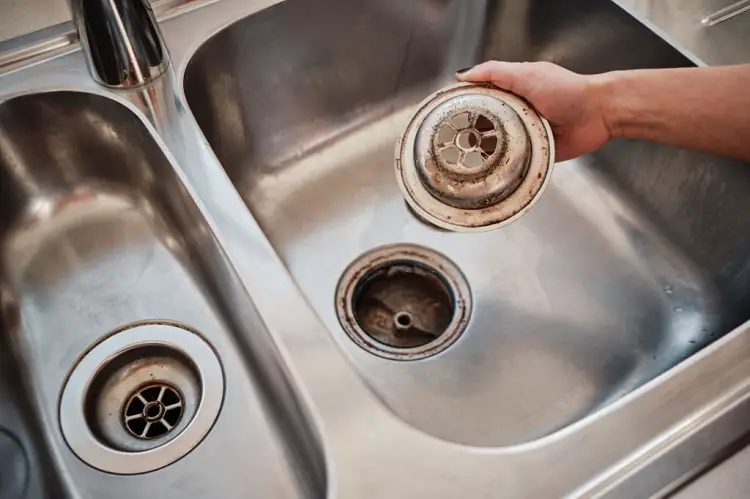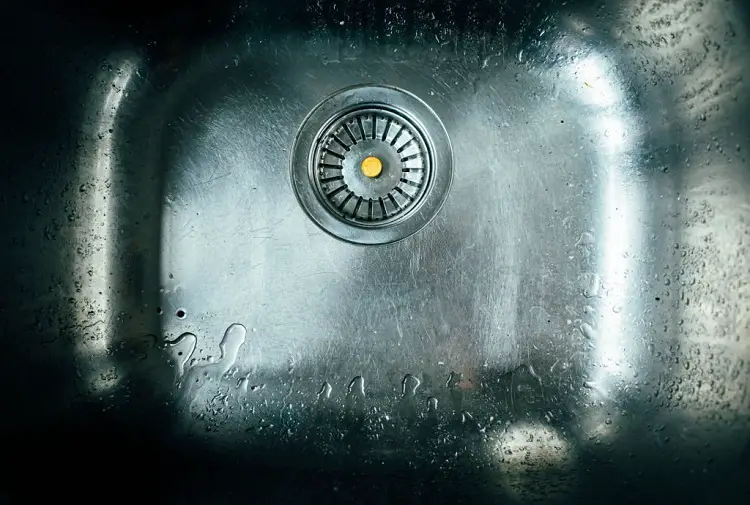Are you having a terrible time with your kitchen, especially the sink? Does your kitchen sink smells like ammonia, and you are worried about it?
Having a kitchen sink that smells like ammonia isn’t a beautiful thing. The unpleasant odor can keep you and your visitor uncomfortable.
Various reasons can cause this unpleasant odor, and they include.
- A buildup of organic material in the drain
- An issue with your plumbing
- A problem with your water supply.
It is important to investigate the source of the odor as soon as possible to ensure that it is not a health hazard.
Let’s explore this issue and possible solutions to eliminate that stinky smell.
Why Your Kitchen Sink Smells Like Ammonia?
There are several reasons why your kitchen sink smells like ammonia, including a buildup of food debris, grease, or bacteria in your drain or issues with your plumbing or ventilation system.
To address this issue, you can try cleaning your sink and drain using a mixture of baking soda and vinegar, or you may want to consider using a specialized drain cleaner.
If the smell persists, it’s best to consult a professional plumber or HVAC technician who can help identify and address the root cause of the problem.
Before investing in a professional plumber, let’s examine the issue and consider some potential DIY solutions to eliminate the unpleasant odor ourselves.
Possible Causes Why Your Kitchen Sinks Smell Like Ammonia
1. Bad vent pipes
In modern plumbing systems, vent traps play a crucial role in controlling air flow and managing sewer gas. If the vent pipes fail, there is a risk of unpleasant odors in the indoor space.
Therefore, it is essential to regularly maintain and inspect the plumbing system to prevent these problems.
2. A build-up of food and debris in the drainpipe
A build-up of food and debris in your drainpipe can create an environment favorable for bacteria organisms to thrive.
As these organisms feed on the debris, they release gases that can cause unpleasant smells.
These smells can be similar to the scent of ammonia, which can be quite unpleasant. It is important to regularly clean your drainpipes to prevent the build-up of debris and the subsequent odor.
3. Slow draining of water
The gradual reduction of water flow through a pipe can result in the accumulation of debris, ultimately leading to blockage and the emission of unpleasant odors.
This common issue can be caused by various factors, including the buildup of sediment, hair, and other materials that can accumulate over time.
It is important to address this problem promptly to prevent further damage and ensure your plumbing system’s safe and efficient operation.
4. Accumulation of rotting food waste
One possible cause of clogged pipes is the accumulation of rotting food waste, such as decaying food scraps, fats, oils, and grease, which can cling to the inner walls of the pipes over time.
This can lead to blockage buildup, impeding water and waste flow, potentially causing backups or other plumbing issues.
It is important to properly dispose of food waste and avoid pouring oils or other greasy substances down the drain to prevent this from happening.
Regularly maintaining and cleaning your pipes can also help keep them clear and free of obstructions.
5. Issue with the sewer
The smell can come from the sewer up to the pipes and then cause the kitchen to smell like ammonia.
This occurs when there’s no water in your U-bend due to a leak or evaporation, causing the sewer gases to waft up your pipe.
If so, you must investigate the U-bend for leaks or obstructions.
If your guess is as good as mine, you may need to remove the U-bend and clean it.
6. Presence of Mold
There is a possibility that the issue may be attributed to the presence of mold. It is crucial to acknowledge that this occurrence is exceedingly uncommon.
What To Do If Your Kitchen Sinks Smells Like Ammonia

If you want to tackle the smell of alcohol from your sink, then diagnosing the problem’s cause is best.
If you’re experiencing unpleasant odors from your kitchen sink, there are a few easy solutions you can try.
You can unclog any blockages, clean the pipes with a store-bought or homemade cleaner, or repair the U-bend.
But if you exhaust all your other options and the smell doesn’t go away, you are getting professional help.
How To Get Rid Of The Smell
Below is a list of the different methods to eliminate nasty kitchen sink drain odors.
If it is a rotting food smell that you want to get rid of, you can try one of the DIY or chemical cleaning methods.
For sewer gas smells, follow the instructions for checking your U-bend.
DIY Drain Cleaning Methods
If you want to follow any DIY methods, you must first identify the problem, whether it is from the drains or under the sink.
Next, use a stopper and fill the sink with a few inches of water. After then, give it time to air out.
After the airing out, try and see if the odor persists. If it is, you have to check underneath the sink to see if you can identify the cause of the smell.
Ensure that all the contents from under your sink are removed. After doing all these things and the odor persist, your sink is full of water. You will need to check other things.
Check if you have a garbage disposal or dishwasher.
The water from your dishwasher passes through your garbage disposal and sink waste lines, so if it is faulty or there is even dirty water sitting in the dishwasher, it could be the cause.
Check if your Garbage disposal probably has a buildup that needs to be cleaned, and when it does, try cleaning it.
It could also be from the sewer gas once there is a bad connection of the waste lines or corrosion. If this is a problem, it might be time to hire a professional.
How to Take Care of the Smell
There are some things you can do to help solve the issue of the smell from the sink that is like ammonia.
If you have a garbage disposal, grind some ice cubes in it; it is necessary because it will help clean the blades and grinding chamber.
Flushing the drain lines with a bleach-and-water solution can help, and you try this as well.
These methods can be helpful in eliminating unpleasant odors caused by spoiled food.
Boiling water
- Have a pan or kettle full of boiled water.
- To avoid clogging the drain, pour the liquid slowly and in small amounts down the plughole.
- Wait 5 minutes
- To ensure all grease is removed, run the cold tap to congeal any remaining grease and flush it out.
White vinegar
- Pour a small amount of white vinegar down the plughole
- Allow it to stand for 30 minutes
- Rinse with hot water
Baking soda and vinegar
- To unclog the drain, pour half a cup of baking soda down the plughole.
- Pour 1 cup of vinegar down the plughole
- Allow the solution to foam and then let it stand for a few hours.
- To clear the blockage, pour boiling water down the drain. This will help flush out any debris.
Chemical Cleaning Methods
Bio-Enzyme Drain Cleaner
This cleaner is an eco-friendly, non-toxic chemical cleaner mode of working by using enzymes that can eat the food debris without causing any damage to your pipes.
Ready-Made Drain Cleaner
Ready-made drain cleaning chemicals can be bought from most hardware stores or supermarkets, but using this has disadvantages since they are made from harsh chemicals.
You must follow labeled instructions and wear rubber gloves and goggles while at it.
Run Ice Cubes and Lemon Juice Through Your Garbage Disposal
Looking for a quick and easy way to keep your garbage disposal clean and free of food particles?
Simply toss some ice cubes and lemon juice to loosen any stubborn bits stuck on the blades.
After that, give it a final polish with a trusty baking soda and vinegar drain cleaner. Your sink will be sparkling clean again!
Other Methods Include
- Try a drain snake: If you’re dealing with stubborn and unpleasant blockages in your drain, a drain snake can be a helpful tool. This simple equipment extends along the drain’s length and can clear hard blockages.
- Replace the toilet ring: If the wax ring on your toilet has failed, the unpleasant odor won’t disappear, no matter how much you clean it. The best and most reliable way to fix this issue is by replacing the wax ring with a new one. It’s recommended to hire a professional plumber to do the job.
Covering the unpleasant odor from a drain with scents is a temporary solution and will not address the underlying issue.
This means it may not fully resolve the house’s problem of a foul smell. It is important to understand that drain smells can worsen over time if left unattended.
It’s important to address sewer gas problems promptly, as they can negatively impact your health and well-being. Some potential issues to look out for include:
- Cough
- Sore throat
- Respiratory issues
- Burning eyes/eye irritation/redness
Excessive levels of sewer gases can lead to the problems mentioned earlier. However, it can be particularly problematic for vulnerable people, such as older adults and children.
Therefore, it’s important to remember that the unpleasant odor is not the only concern.
Read Also: Why Your Grill Smells Like Propane
How To Prevent Your Sink From Having Ammonia Smell
To prevent your sink from having the ammonia smell, you can try out the following:
- To prevent food chunks from clogging your pipes, it’s recommended to place a drain screen over your plughole.
- Avoid pouring fat or grease down the drain. Instead of washing your pans with leftover fat, use kitchen towels to soak or scrape them beforehand.
- To eliminate bacteria, dispose of any remaining hot water by pouring it down the drain..
- Pour baking soda down your drain about once a week.
- Schedule regular service checks. Regularly having a professional plumber inspect your pipes will ensure they remain clean and in good condition.
Read Also: How To Sanitize Granite Countertops
Conclusion
I hope this article has given an in-depth discussion on why your kitchen sink smells like ammonia has been answered?
There are many reasons why your sink may smell like ammonia, and there are also ways you can take care of them, which the article has provided.
If you don’t want your sink smelling that way, adhere to the abovementioned preventive measures.

